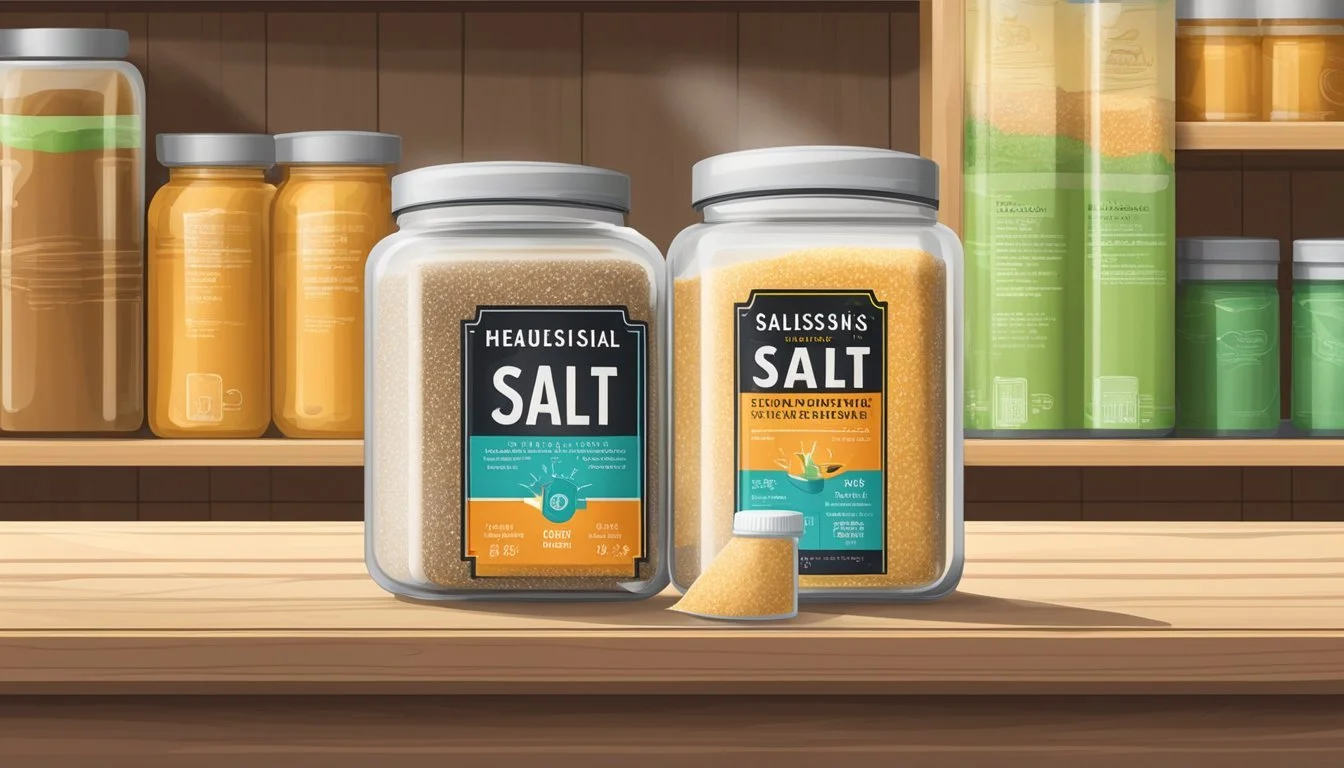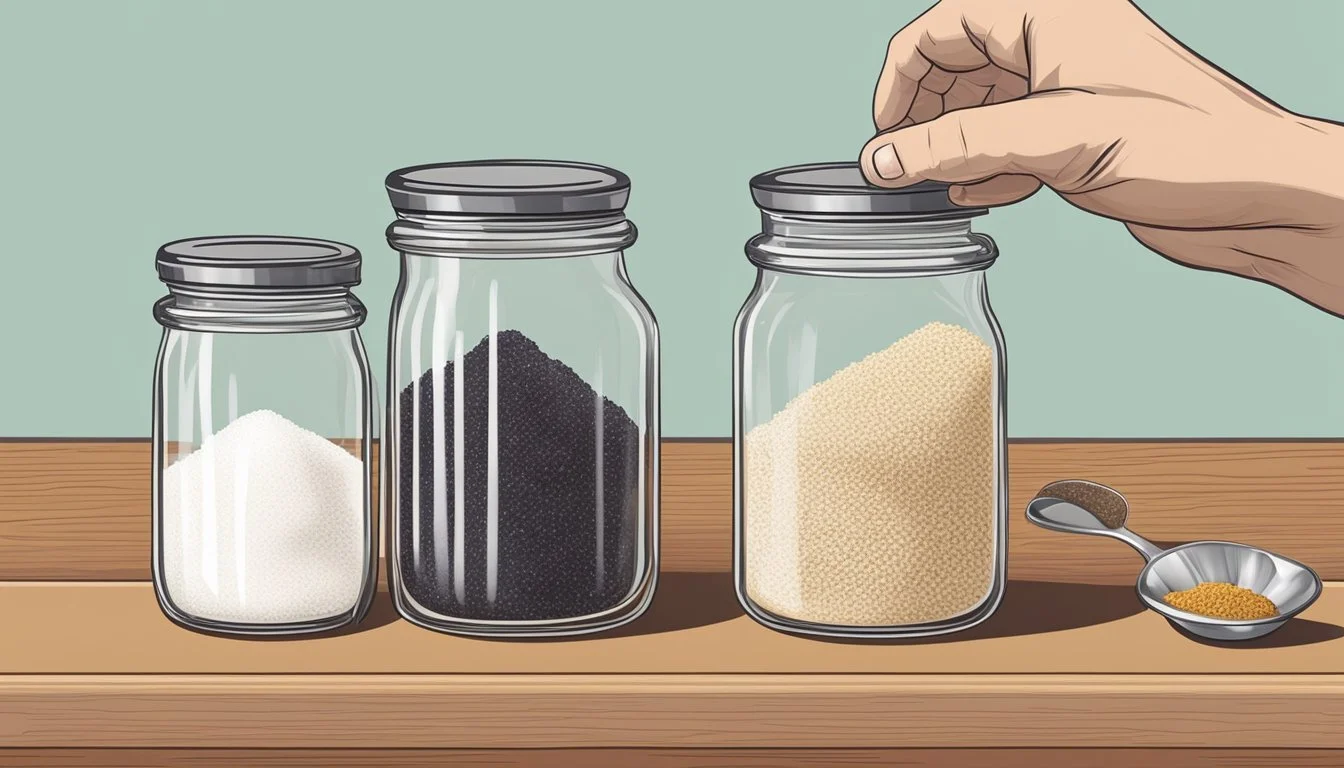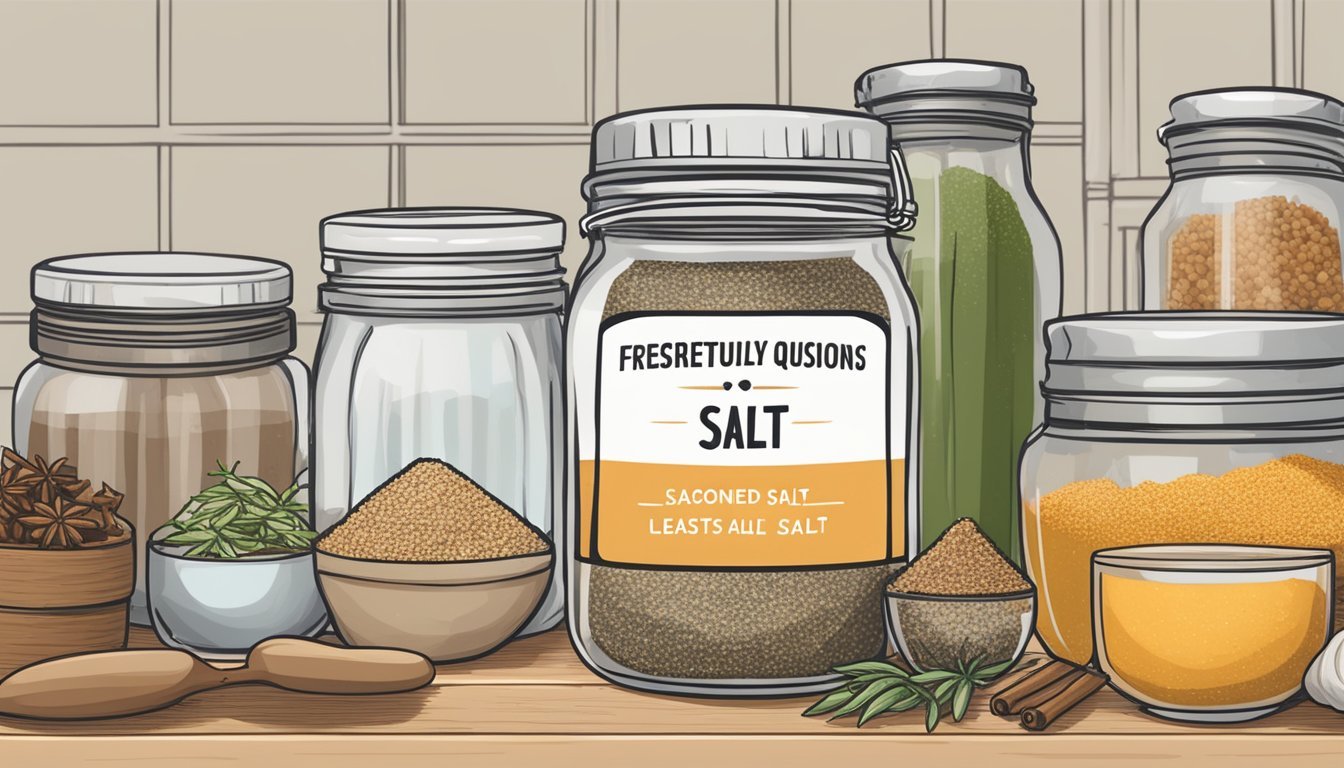How Long Does Seasoned Salt Last?
Shelf Life and Storage Tips
Seasoned salt, a pantry staple, blends salt with various herbs and spices to enhance the flavor of dishes. Its popularity stems from its ability to add depth and complexity to recipes with a single ingredient. While seasoned salt is a valuable addition to any kitchen, understanding its shelf life is key to maintaining its quality and effectiveness in cooking.
Typically, seasoned salt boasts a long shelf life due to its dry and inhospitable environment for bacterial growth. Although many believe that seasoned salt can last indefinitely, its potency and flavor can diminish over time. Consumers are advised to note the expiration date provided by the manufacturer, which serves as a reliable guideline for freshness.
In terms of usage, seasoned salt finds its place in a wide array of culinary applications, from simple dishes to complex recipes. For optimal taste, it's essential to store seasoned salt in a cool, dry place away from direct sunlight and moisture, which can lead to clumping and weaken its flavor. Regularly assessing its aroma and color can help determine its freshness and ensure that it continues to elevate meals with its intended zest.
Understanding Seasoned Salt
Seasoned salt is a blend that brings together various spices and herbs to enhance the flavor of dishes. It is used as an all-purpose seasoning in culinary applications.
Composition and Ingredients
Seasoned salt typically consists of table salt as its base, and it is elevated with a mixture of herbs and spices. Common ingredients include:
Garlic Powder: (how long does garlic powder last?) Adds a warm, savory flavor.
Onion Powder: Provides a slightly sweet yet pungent note.
Paprika: Offers a sweet or smoky taste with a vibrant color.
Black Pepper: Contributes a sharp and mildly spicy flavor.
Cayenne Pepper: Delivers heat and a touch of acidity.
These components are often accompanied by:
Kosher Salt: Known for its larger flakes and less refined nature.
Sea Salt: (how long does sea salt last?) Valued for its trace minerals and coarser texture.
Types of Seasoned Salt
There are various types of seasoned salt tailored to different culinary needs:
Spiced Salts: Incorporate a specific combination of spices, such as cayenne or paprika, for a distinct flavor profile.
Herbed Salts: Blend salt with dried herbs like rosemary, thyme, or basil.
Specialty Blends: These may be designed for particular cuisines or dishes, combining a unique set of seasonings to create a signature flavor.
Each type of seasoned salt can be suited to a range of foods, from meats and vegetables to snacks and beverages.
Shelf Life of Seasoned Salt
Seasoned salt typically maintains its quality and potency for a significant duration. However, like many food products, it does not last indefinitely.
Determining Expiration
The expiration date on a package of seasoned salt serves as the manufacturer's best estimate for when the product will start to diminish in flavor and quality. Though not a spoilage date, it signals when consumers might begin to notice a difference. Manufacturers usually recommend consuming seasoned salt within 2 to 3 years of the production date to enjoy its optimal taste, assuming proper storage conditions.
Factors Affecting Potency Over Time
Several factors can contribute to the decrease in the quality and potency of seasoned salt over time:
Exposure to humidity and moisture: This can result in clumping and make the seasonings less potent.
Temperature fluctuations: Storing in a cool, dry place can help maintain quality.
Light exposure: Keeping seasoned salt away from direct light can prevent degradation of certain spice components.
By considering these factors, consumers can ensure that their seasoned salt retains its flavor and effectiveness for as long as possible. However, seasoned salt will not spoil in the same way perishable foods do but rather lose its potency, leading to lackluster flavors in culinary applications.
Proper Storage Techniques
To maintain the quality and extend the shelf life of seasoned salt, understanding and implementing proper storage techniques is essential.
Ideal Storage Conditions
Seasoned salt should be kept in an airtight container to protect it from moisture and air. A dry place such as a spice cabinet, cupboard, or pantry that is away from heat sources will provide the optimal storage environment. The area should be cool to help preserve the flavor and prevent the salt from caking.
Airtight Container: Glass jars with tight-fitting lids, plastic bags, or plastic bins.
Temperature: Room temperature or slightly cooler, ideally between 60-70°F (15-21°C).
Location: Choose a spot that's away from the stove, oven, or dishwasher where heat and humidity are more prevalent.
Signs of Degradation
While seasoned salt does not spoil like fresh food, its potency can decrease over time. Indicators that seasoned salt is degrading include:
Clumping: Excessive moisture can lead to caking.
Fading Aroma: A significant reduction in scent may suggest a loss of potency.
Dull Flavor: When the taste is no longer vibrant or has noticeably diminished.
To prevent these issues:
Monitor for Moisture: Use moisture absorbers in storage areas if necessary.
Avoid Light and Air: Store away from direct sunlight and ensure containers are sealed properly after each use.
Check Regularly: Inspect the seasoned salt for any changes in appearance, smell, or flavor.
Usage and Application
Seasoned salt is a versatile ingredient that elevates the taste of various dishes. It can be expertly applied to amplify flavor profiles and can serve alternative purposes beyond cooking.
Enhancing Dishes with Seasoned Salt
Seasoned salt is primarily used to enhance the flavor of a wide range of dishes. Its application extends to:
Meat: It provides a quick and easy way to season all types of meat including chicken and steak.
Vegetables: A light sprinkling can significantly boost the natural flavors of both raw and cooked vegetables (how long do cooked vegetables last?).
French Fries and Burgers: A generous dash of seasoned salt can transform these fast food staples into gourmet-tasting treats.
Popcorn: Instead of regular salt, a pinch of seasoned salt can add complexity to this simple snack.
Incorporating seasoned salt into various recipes can simplify the seasoning process, ensuring a consistent and well-rounded flavor profile with less effort.
Alternative Uses for Seasoned Salt
Beyond its culinary applications, seasoned salt offers other benefits:
Homemade Seasoned Salt: Creating a blend at home allows one to tailor the flavors and control the quality of ingredients.
Soups: A small amount can intensify the overall aroma and taste of soups, allowing each individual ingredient to shine.
Recipe Enhancer: By adding seasoned salt to a basic recipe, chefs can transform a simple dish into something unique, often with just this single addition.
Seasoned salt is not just a condiment; it's an essential tool in the kitchen that can both simplify and elevate cooking practices.
Making Your Own Seasoned Salt
Creating homemade seasoned salt allows individuals to tailor flavors to their exact liking and can be an easy and quick process, often requiring basic ingredients and minimal preparation time.
Customizing Flavor Profiles
One can experiment with a variety of spices and dried herbs to create custom flavor profiles for seasoned salt. Essential components often include salt (kosher or sea salt preferred), garlic powder, onion powder, and ground pepper as a base. From this foundation, additional spices such as paprika, for color and sweetness, and cayenne, for heat, are commonly added. Adventurous cooks might incorporate dried herbs like thyme or rosemary, and even more aromatic spices like cumin or coriander. Using a spice grinder ensures an even blend, enhancing the overall aroma and taste of the seasoning. The process usually involves measuring out the ingredients and using a bowl to stir them to combine thoroughly.
Storage and Shelf Life of Homemade Blends
The proper storage of homemade seasoned salt is crucial for maintaining its flavor and extending its shelf life. An airtight container, such as a glass jar with a tight-fitting lid, is ideal. The storage location should be cool, dry, and away from direct sunlight to prevent clumping and preserve the seasoning's color and aroma. When stored correctly, the seasoned salt should remain fresh and potent for up to 6 months. It's recommended to label the container with the prep date to keep track of freshness. Regular sniff tests can help determine if the blend still has its robust smell and, consequently, its taste.
Health Considerations and Alternatives
When considering the use of seasoned salt, individuals should be mindful of sodium intake and the health implications associated with it. Alternatives exist that can help manage overall sodium consumption without sacrificing flavor in recipes.
Managing Sodium Intake
Sodium Intake: A high sodium intake is linked to an increased risk of hypertension, heart disease, and stroke. Seasoned salts typically contain significant amounts of sodium, which can make it challenging to stay within the American Heart Association's recommendation of no more than 2,300 milligrams per day. One should be particularly cautious if they are prone to sodium-sensitive health conditions.
Preservatives: Seasoned salt often includes preservatives that contribute to its sodium content.
Pure Salt Quality: It is important to note that while iodized and pure salts are common, they can significantly influence the total sodium intake.
Healthy Alternatives:
Celery Salt: A seasoned salt alternative made from ground celery seeds and salt, providing a similar flavor profile with potentially different sodium levels.
Sea Salt: While sea salt is often marketed as a natural alternative, its sodium content is comparable to table salt; thus, quantity management is crucial.
Substitutes and Variations
Recipe Adaptation: One can modify recipes to use less seasoned salt or substitute other spices and herbs, which can contribute robust flavors without the added sodium.
Alternative Options:
Herb Mixes: Utilizing a mix of herbs such as basil, ginger, and black pepper can mimic the sensory impact of salt.
Potassium Chloride: A salt substitute that can help manage sodium intake; however, it should be used carefully, especially by individuals with kidney issues or those on potassium-restricted diets.
In summary, while seasoned salts can add depth to dishes, their sodium content can present health concerns. Exploring herb blends and various salt alternatives can offer flavorful solutions while aiding in the reduction of sodium consumption.
Frequently Asked Questions
In the discussion of seasoned salt's longevity, consumers often have two primary concerns: if and when it goes bad, and how they can identify spoilage.
Does Seasoned Salt Ever Go Bad?
Seasoned salt typically consists of salt mixed with herbs and spices. Salt acts as a preservative and can last indefinitely under ideal conditions. However, the additional ingredients in seasoned salt do have a shelf life and can expire, causing the product to lose its optimal taste and potency over time. Most manufacturers suggest a shelf life of 1 to 4 years for seasoned salt. Proper storage—in a cool, dry place away from direct sunlight—can help in preserving its quality for the longest time possible.
How to Tell If Seasoned Salt Has Gone Bad?
Although seasoned salt does not spoil in the traditional sense, it can still lose its flavor or become less effective as a seasoning. The indicators that seasoned salt is past its prime include:
Smell: A loss of aroma or a noticeable change in the scent can suggest the seasoning's essential oils have dissipated.
Taste: If the seasoning tastes bland or noticeably different, it may have degraded.
Color: Fading or changes in color can signal that the spice elements within the seasoned salt are no longer fresh.
Clumping: While clumps in salt can often be due to humidity, they can also indicate that the seasoning has been exposed to moisture and could be compromised.
Regular checks for these signs can help determine if the seasoned salt is still effective for culinary uses.









